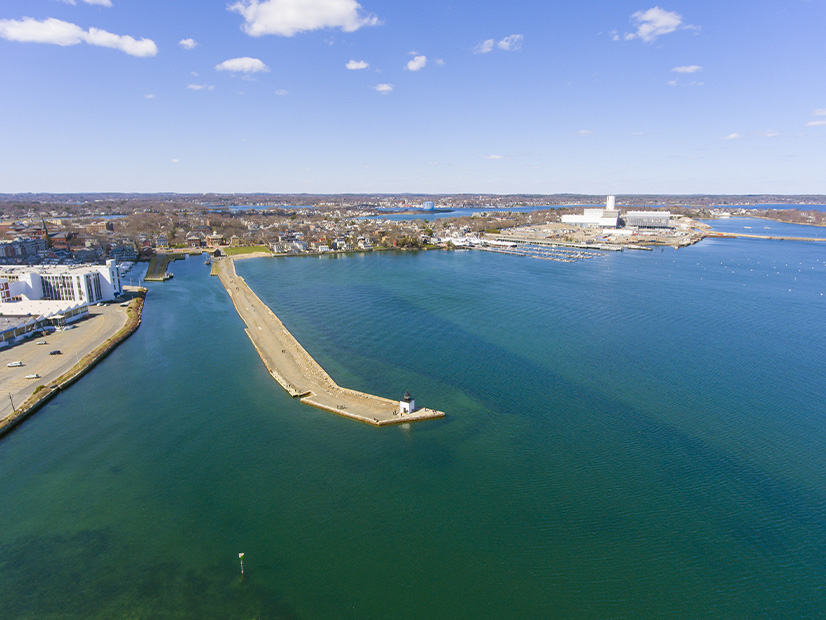
Massachusetts legislators are considering a bill that would remove the current price cap requirement for new offshore wind project bids.
“The price cap gets in the way of our competitiveness and discourages some developers from offering more creative, diverse and comprehensive proposals,” Gov. Charlie Baker said Tuesday. “Removing it would give bidders the flexibility to offer important added benefits to Massachusetts residents, including economic investment, job creation and reliability solutions, such as transmission and energy storage.”
While the price cap was important to the state’s early OSW procurement process, removing it responds to “signals” in the market, Baker said in hearing testimony before the Joint Committee on Telecommunications, Utilities and Energy.
But moving forward without the cap could risk driving up the comparatively low bids that Massachusetts received in its first three procurement rounds, Sen. Mike Barrett, co-chair of the committee, said during the hearing.
The costs for Sunrise Wind and Empire Wind in New York are 43% higher than Mayflower Wind’s winning $58/MWh bid in 2019 in Massachusetts, according to the U.S. Department of Energy. Revolution Wind’s bid in Connecticut is 68% higher than Mayflower’s bid, while Ocean Wind’s bid in New Jersey is twice that of Mayflower.
Under the current Massachusetts procurement process, regulators cannot approve a contract with a per-megawatt-hour bid, plus associated transmission costs, that exceeds the winning bid price from the previous procurement round.
Barrett urged Baker to consider alternatives to removing the cap, including removing the current requirement that project-related transmission costs be included in the bid price. The number of OSW developers, Barrett said, is too small right now to create market competitiveness. Only four developers have submitted their projects for Massachusetts’ three OSW procurements.
A provision in the procurement process protects the state from high bids by allowing utilities the right to reject a bid they do not like, according to Executive Office of Energy and Environmental Affairs Secretary Kathleen Theoharides.
In such a small market, Barrett said, Massachusetts does not have the luxury of rejecting bids. “It’s basically an oligopoly,” he said.
Lifting the cap may lead to somewhat higher per-megawatt-hour prices, Theoharides said in her testimony, but a price increase would come with more benefits that have been missing from previous bids.
“Getting additional benefits through a more flexible contract … that includes storage … hydrogen … and better interconnections means that ratepayers will save money not just from the one offshore wind contract but across the system with the additional benefits more creative contracts can provide,” she said.
Additional Changes
The bill (H.4204), which Baker filed in October, would transfer the authority for selecting winning bids from Massachusetts’ utilities to the Department of Energy Resources (DOER) to help speed up the contract negotiation process.
“Speed is important in future solicitations and especially important as we pursue somewhere on the order of 15 to 20 GW of offshore wind over the next 30 years,” Theoharides said.
While parties to the contract negotiations for Massachusetts projects “strive for consensus,” she said, disagreements still occur and have stalled the process in the past. If there’s no clear path to a consensus in future negotiations, DOER would be able to consult with an independent evaluator and make a final decision on the procurement.
“This ensures we can press forward swiftly and not allow an overly long process or disagreements to hinder our climate goals,” Theoharides said.
The bill also would codify new provisions to advance diversity and equity that were in the state’s most recent OSW request for proposals.
Bidders had to demonstrate how their projects would ensure the development of a diverse, equitable and inclusive workforce, as well as provide economic benefits for ratepayers, foster economic development and protect environmental justice communities.
“This legislation now captures these changes to the procurement criteria,” Theoharides said.
New Funding
Baker is seeking what he said would be a “game-changing investment” to advance clean energy innovation in the state.
The bill would authorize a $750 million transfer from the state’s COVID-19 response fund to the Clean Energy Investment Fund.
The fund, Baker said, would support emerging clean energy innovators, institutions and businesses; provide funding to colleges, universities and vocational technical institutions; and assist regional employment boards.


